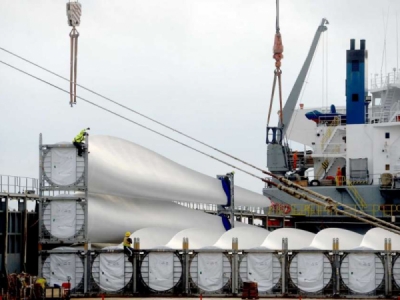
Posted on March 30, 2020
Labor leaders say regional ports are still on track to see a growth in tonnage numbers despite changes and precautions the Southeast Texas shipping industry has experienced during the coronavirus pandemic.
Since local authorities started enforcing infection prevention policies two weeks ago, the Coast Guard has issued five Captain of the Port orders for the Sabine-Neches Waterway. Those orders either require crew to stay aboard their vessel or hold the vessel outside the port for varying periods of time, said Capt. Jackie Twomey, commanding officer of the U.S. Coast Guard Marine Safety Unit Port Arthur. The latest of those orders was issued earlier this week.
So far, the International Longshoremen’s Association hasn’t reported any major disruptions in activity to regional ports from these precautions or illness among the workforce.
Allen Rob, South Atlantic and Gulf Coast District president with the ILA, said container numbers for the Gulf Coast region were up 25 percent over the same time last year in January and February, indicating growth in activity. Rob said he didn’t expect a decrease in activity for March, but any growth likely wouldn’t hit double digits.
“Where our tonnage will likely decrease is in the break bulk sector,” Rob said, referring to cargo that is in individual pieces rather than containers. “But that is likely due to tariffs catching up with industry.”
Major interruptions at ports have largely missed Southeast Texas, so far. Rob said the Port of Houston has had only six “blank sails,” meaning ships were sent away without being unloaded or stocked. He said there have been at least 40 “blank sails” at West Coast ports.
The Port of Houston is the first one on the Gulf Coast to become the scene of a positive case, which forced the closure of two of its terminals. The port determined an employee who worked at both terminals had tested positive for the novel coronavirus. An investigation to determine how many people were potentially exposed is ongoing.
Officials at the Port of Beaumont have said it can continue work as usual with the prevention steps it has enacted, but it will change its policies or operations as safety demands.
“The well-being of Port of Beaumont employees, tenants, contractors, customers and the community are a top priority as we navigate this outbreak and the short- and long-term impacts it will have on our region,” Port Director Chris Fisher said. “The port will continue to closely monitor and respond to COVID-19 to ensure our community remains safe and operations move forward, so long as it does not jeopardize the health of our team.”
In the labor halls and port terminals, workers have started using caution and adopting some of the guidelines from the Centers for Disease Control and Prevention and World Health Organization into their daily routine.
Stevedores and warehouse staff have been advised to keep their distance from others and use the hand sanitizing stations like the ones Beaumont’s port has rolled out, but Rob said locals have taken a drastic look at the way they do business.
“We’ve got some locals hiring outside and others are taking temperatures at the door when people show up,” Rob said. “Mostly, we’ve suggested limiting the amount of people inside at one time. That might mean bringing in groups one at a time based on seniority and suggesting people wait in their cars until their hire time comes up.”
He said the Longshoreman’s Association has given its locals discretion to take care of workers, like keeping the engineers in charge of plugging up refrigerated containers off of ships and using the vessel’s crew to do the task.
The Port of Beaumont announced its own change in work policies and enforced social distancing in the workplace at the beginning of last week to help reduce risk of infection but said in a public statement that it wasn’t experiencing any “adverse effects to shipping activity.”
As for Southeast Texas’ other economic engine, oil and gas companies have said they are pushing ahead with normal production despite massive fluctuations in the market.
The United Steelworkers International hasn’t published any statements or guidance to its membership yet.
Representatives from Exxon Mobil in Beaumont and Motiva and Valero in Port Arthur said that operations at their respective complexes have continued as normal. Most plants have sent home nonessential personnel for remote work. Exxon Mobil instituted a 14-day remote work policy for anyone who recently traveled to an area with “sustained community transmission.”
Reuters reported last week that impacts on travel are expected to reduce U.S. petroleum demand by as much as 2.5 million barrels per day.
Last week, the U.S. Department of Energy announced it would purchase 77 million barrels of American crude oil, maxing out the storage of the Strategic Petroleum Reserve, to assist the industry.
“DOE is moving quickly to support U.S. oil producers facing potentially catastrophic losses from the impacts of COVID-19 and the intentional disruption to world oil markets by foreign actors,” U.S. Energy Secretary Dan Brouillette said in a conference call.
The first round of bids for 30 million barrels is already underway, and the department said preference would be given to small and mid-size producers. Deliveries of oil to the reserve could be expected up until June, according to the department.
West Texas crude closed at $24.31 a barrel Wednesday afternoon, about $4 higher than its lowest point March 16. It was at almost $59 one year ago.
jacob.dick@beaumontenterprise.com
twitter.com/jdickjournalism
Source: beaumontenterprise





